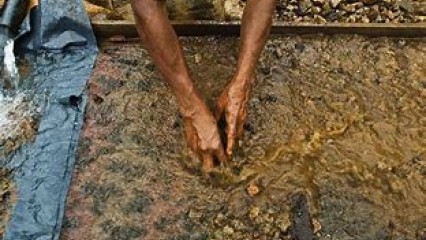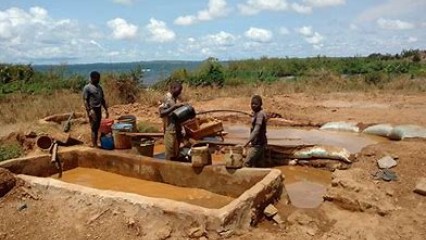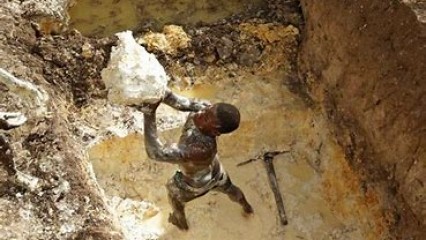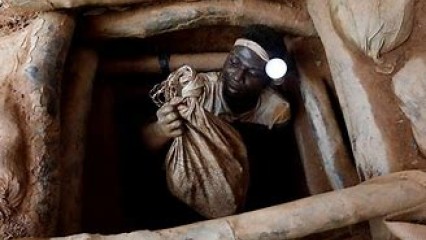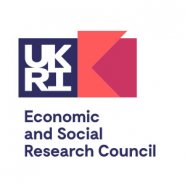
Rethinking artisanal and large-scale mine relations in sub-Saharan Africa
Start date
December 2023End date
December 2024Overview
This ESRC IAA funded project has supported the coexistence of artisanal and small-scale mining (ASM) groups and large-scale mining companies in sub-Saharan Africa. It built on an IAA funded rapid response activity that sought to stimulate innovation and support for ASM in the region.
ASM involves low-tech, labour-intensive mineral extraction and processing, and is an important socio-economic sector for the rural poor in developing nations, many of whom have few other options for supporting their families. It is widely recognised as sub-Saharan Africa’s most important rural non-farm activity, providing direct employment to tens of millions of men and women, generating income to sustain family farms, bolstering food security at the local level, and funding children’s school fees.
In recent decades, tensions between large-scale mine management and individuals engaged in ASM have escalated across sub-Saharan Africa, particularly over gold. The mining of gold has brought small and large-scale mining parties into conflict, and the team working on this project are looking to develop a model of autonomous co-existence by investigating developments, engaging stakeholders and identifying opportunities to demarcate equitably gold-mineralised lands to both.
Team

Principal Investigator
Professor Gavin Hilson
Professor and Chair of Sustainability in Business
Biography
Gavin is a leading global authority on the environmental and social impacts of the small-scale mining sector. He has published over 300 journal articles, book chapters and reports on the subject, his specialist knowledge widely recognized internationally. He has delivered talks on small-scale mining at United Nations headquarters in New York, the World Bank in Washington DC and several universities worldwide. He has also provided consultancy services on the subject for a range of organizations: the UK Department for International Development, World Bank and EGMONT (Royal Institute for International Relations in Brussels); the NGO sector, including the Alliance for Responsible Mining and the WWF Guianas; and corporations such as Newmont Gold Mining, Rio Tinto Exploration and Gold Fields. Gavin is editor-in-chief of The Extractive Industries and Society (Elsevier Science), and is on the editorial boards of The Journal of Cleaner Production (Elsevier Science), Resources Policy (Elsevier Science), Mineral Economics (Springer) and The International Journal of Surface Mining, Reclamation and Environment (Taylor & Francis). He was also an inaugural executive board member (2006) of the Diamond Development Initiative (DDI), an NGO established to improve awareness and eliminate circulation of 'conflict diamonds', stepping down in 2019. Since this time, he has served on as an Executive Board Member for the Ottawa-based NGO, IMPACT.
He received Bachelor's and Master's degrees from the University of Toronto, and his PhD from the Imperial College of Science, Technology and Medicine. His first academic post was at Cardiff University, where he held the post, Lecturer in Environmental Policy, in the School of City and Regional Planning. Following this appointment, he moved to the Institute of Development Policy and Management (IDPM), the University of Manchester, where he held the post of Lecturer in Environment and Development. In 2007, he moved to the School of Agriculture, Policy and Development, The University of Reading, taking up a permanent lectureship in Environment and Development. He was promoted to Reader in 2009.
Editor-in-Chief, The Extractive Industries and Society
The Extractive Industries and Society is the one journal devoted to disseminating in-depth analysis of the socio-economic and environmental impacts of mining and oil and gas production on societies, both past and present. It provides a platform for the exchange of ideas on a wide range of issues and debates on the extractive industries and development, bringing together research undertaken by an interdisciplinary group of social scientists in academia, government, the NGO community and industry. Topics covered by the journal include environmental management at mines and rigs; Corporate Social Responsibility and community development; the environmental and social impacts of artisanal and small-scale mining in developing countries; corruption and the extractive industries; industry reform; the donor community and the extractive industries; climate change and fossil fuel extraction; and taxation and foreign direct investment in the sector. Submissions which draw upon experiences from both developed and developing countries are invited from across the social sciences. The journal publishes original research articles, field reports, critical reviews, conference reports, book reviews and short correspondences. For more information, including 'Instructions for Authors', please visit the journal website at www.journals.elsevier.com/the-extractive-industries-and-society/.
Editor-in-Chief, The Journal of Environment & Development
The Journal of Environment & Development (JED) offers policy-makers, non-governmental organizations, scientists, academics, and the business community the only international forum that combines cutting edge academic research with practical analysis of working policies. The broad scope and interdisciplinary nature of The Journal of Environment & Development are demonstrated by the wide variety of interests and disciplines of its readers and contributors, which include political science, international relations, economics, development studies, sociology, environmental studies and law. For more information, including 'Instructions for Authors', please visit the journal website at https://journals.sagepub.com/overview-metric/JED

Partner
Cynthia Kumah
CT-Trust Foundation Ghana

Partner
Dr Rachel Perks
World Bank, Washington DC

Partner
Adama Bocoum
L'Alliance pour la Recherche et le Développement Intégré
Impact
Donors, foremost the World Bank and United Nations (and partners), and industry bodies such as the International Council on Mining and Metals (ICMM) and World Gold Council have called on multinational companies to forge partnerships with the ASM groups operating on their concessions; they have even gone as far as to encourage mining companies to purchase gold extracted by ASM groups.
The aim of the planned impact work, therefore, was to change the narrative on ASM-large-scale mine relations in sub-Saharan Africa to allow autonomous coexistence to happen. The team has shifted the focus of the debate to the much-overlooked exploration phase, and through a comprehensive programme of stakeholder engagement, they have stimulated change from within and developed a model that can be implemented in the region’s major gold-producers. This has been achieved by direct engagement with exploration companies, empowerment of ASM communities, and dialogue with donors and the private sector.
An unexpected impact outcome emerging from this project is the request from multiple small scale gold mining companies in Africa to work closely with Professor Hilson on revising their ASM policies and strategies. Gavin is also working with the World Bank on designing and launching a comprehensive ASM training module to significantly increase the impact of this work across the region.
